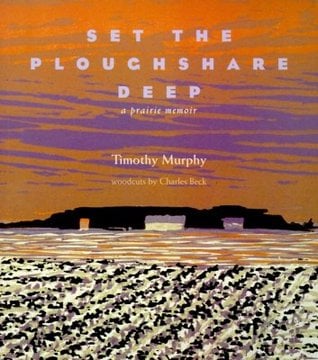Totally innocent of the myth of progress and the scandal of death and failure that account for modern sentimentality in its most wrongheaded and obnoxious form, Set the Ploughshare Deep is as realistic a work as a novel by Thomas Hardy or the Old Testament.
Tractor and combine axle-deep in
muck,seedcorn and soybeans frozen in
the field,the home farm pledged against a
bumper yield,he has run out of money, time and
luck.What would his frugal Swedish
forebears thinkto see their hard-won holdings on
the block?There is no solace for a laughing-
stockin woman’s arms, religion or strong
drink.Any day now the banker will fore-
close,summon the sheriff and the auc-
tioneers.What will he tell his sons in twenty
years?He cannot wholly blame the early
snows.(“The Failure”)
In fact, the one sentimental line in the entire book, quoted by the author’s father at a funeral, is attributable not to Tim Murphy but to that old prairie sentimentalist and windbag, Carl Sandburg. “To live hard, work hard, and die hard and then go to hell after all that would be too damn hard.” Now that is sentimentality, and of the 150-proof variety to boot.
The structure of this book, really the product of four intelligences (Murphy, a poet, venture-capitalist, and farmer; Charles Beck, a woodcut artist; Vincent Murphy, Tim’s father, who contributes his recollections of the Great Depression; and Alan Sullivan, Murphy’s collaborator, whom the author credits with having gathered and arranged fragments of narrative and, where necessary, ghosted linkages between them), is episodic rather than fragmentary: a single poetic fabric in which prose and verse, word and image, author and subject are closely interwoven. Born in Minnesota in 1951 at the height of the blizzard of January 10 (the worst in 63 years). Murphy went off to Yale where he studied under Robert Penn Warren, who advised him to return to North Dakota and sink his toes deep into home soil. (“He was tutor to a lad / he never really knew— / only the shock of red / like sunrise on a slough.”) At home, the young man went into his father’s insurance business, while beginning to acquire farm properties of his own. Combining business with farming with poetry, not to mention hunting, proved as conducive to artistic development as it did to material success and even survival, accounting for the humorous stoicism, or stoic humor, that marks the poetry even more strongly than it does the prose.
Bristling with fallen trees
and choked with broken ice
the river threatens the house.
I’ll wind up planting rice
If the spring rains don’t cease.
What ancestral curse
prompts me to farm and worse,
convert my woes to verse?
(“Twice Cursed”)
Murphy’s descriptions of the flood of 1975 when the Red River overflowed its banks, and of the drought that ensued the following year, are as harrowing as any accounts of natural disasters in the work of Laura Ingalls Wilder; more mundane tribulations and challenges echo a recently published memoir by another North Dakotan author, Larry Woiwode, likewise returned (albeit much later in life) from the East Coast to grapple with his unforgiving native heath. Whether working in prose or in verse. Murphy displays a marked ability to combine grief with resignation, pathos with serenity:
We grieve for the twelve trees we
lost last night,pillars of our community, old
friendsand confidants dismembered in
our sight,stripped of their crowns by the un-
ruly winds.There were no baskets to receive
their heads,no women knitting by the guil-
lotines,only two sleepers roused from their
bedsby fusillades of hailstones on the
screens.Her nest shattered, her battered
hatchlings drowned,a stunned and silent junko watches
mechainsawing limbs from corpses of
the downed,clearing the understory of debris
while supple saplings that survived
the blastlay claim to light and liberty at last.
(“The Track of a Storm”)
This is rural wisdom, the husbandman’s philosophy at its most articulate, trenchant, and profound. Also proud, uncorrupted. Although Murphy is a skilled portraitist (of hunting dogs, as well as of men and women), nothing in this line quite matches his father’s unassuming gem of self-revelation in a small story he tells on himself.
One day I was walking behind four horses and a drag while the dust blew. I could hardly see and every muscle in my body ached. Wlien I paused near the highway I saw a man go by smoking a cigar in a big black car. I had been reading Dos Passos and this prompted me to call the driver a bad name. I was leaning toward socialism and thinking there must be a better way. Years later I bought the longest, blackest Oldsmobile to show there was no bitterness in my heart. I never did take up cigar smoking.
No, Tim Murphy doesn’t accept government support in maintaining, improving, and expanding his farms. His wonderful little book wasn’t published on an NEA grant, either.
[Set the Ploughshare Deep: A Prairie Memoir, by Timothy Murphy Athens (Ohio: University of Ohio Press) 108 pp., $29.95]

Leave a Reply